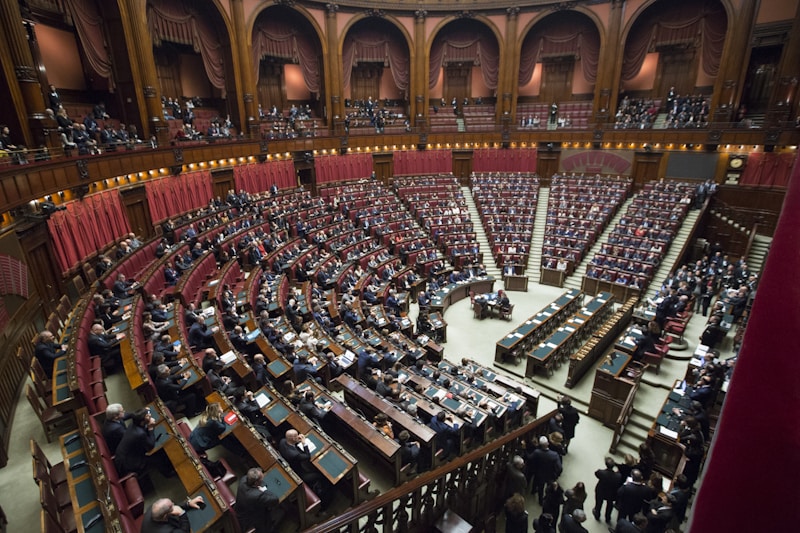Tulsi Gabbard From Hawaii Congresswoman to Director of National Intelligence
Tulsi Gabbard: From Hawaii Congresswoman to Director of National Intelligence - Complete Biography and Career Timeline
Table of Contents
- 🌺 Early Life and Hawaii Roots
- 🪖 Distinguished Military Service and Combat Experience
- 🗳️ Political Rise from State Legislature to Congress
- 🏛️ Congressional Career and Legislative Achievements
- 🇺🇸 2020 Presidential Campaign
- 🔄 From Democrat to Independent to Republican
- 🎖️ Director of National Intelligence Appointment
- 📋 Key Policy Positions and Controversies
- 👤 Personal Life and Faith
- 🏆 Legacy and Impact on American Politics
- ❓ Frequently Asked Questions

Tulsi Gabbard has emerged as one of the most fascinating and controversial figures in modern American politics. From her groundbreaking role as the first Hindu American in Congress to her current position as the eighth Director of National Intelligence, Gabbard's journey represents a unique blend of military service, political evolution, and unwavering commitment to her principles. This comprehensive biography explores every aspect of her remarkable career, policy positions, and the controversies that have shaped her public persona.
🌺 Early Life and Hawaii Roots
Born on April 12, 1981, in Leloaloa, American Samoa, Tulsi Gabbard's early life was shaped by the diverse cultural landscape of the Pacific Islands. Her father, Mike Gabbard, is of Samoan and European ancestry, while her mother, Carol Porter Gabbard, hails from Indiana with roots in Michigan. This multicultural background would later influence her worldview and political perspectives.

When Gabbard was just two years old, her family relocated to Hawaii, where she would spend her formative years. Growing up in Honolulu, she was immersed in a unique blend of American and Pacific Islander cultures. Her parents operated The Natural Deli, a vegetarian restaurant in Moiliili, which exposed young Tulsi to health-conscious living and alternative lifestyle choices from an early age.
Unconventional Education and Spiritual Development
Gabbard's educational journey was far from traditional. Primarily homeschooled, she spent only two years at a formal institution - a girls' school in the Philippines. This unconventional approach to education fostered independence and critical thinking skills that would later serve her well in her political and military careers.
During her teenage years, Gabbard embraced Hinduism, finding particular inspiration in the Bhagavad Gita. This ancient Indian text's teachings on duty, righteousness, and karma became foundational to her personal philosophy and later influenced her approach to public service.
Early Involvement in Politics and Activism
Politics entered Gabbard's life early through her father's involvement in local Hawaiian politics and activism. She worked for Stand Up For America (SUFA), an organization founded by her father following the September 11 attacks. This early exposure to political organizing and activism provided valuable experience that would prove instrumental in her future career.

🪖 Distinguished Military Service and Combat Experience
Tulsi Gabbard's military service began in April 2003 when she enlisted in the Hawaii Army National Guard while serving in the Hawaii State Legislature. This decision to serve her country would become a defining aspect of her identity and political career, providing her with unique credentials that few politicians possess.
Deployment to Iraq and Combat Experience
In July 2004, Gabbard made the significant decision to deploy to Iraq for a 12-month tour, serving as a specialist with the Medical Company, 29th Support Battalion. Her deployment to Logistical Support Area Anaconda placed her in a dangerous combat zone where she gained firsthand experience of the realities of war.
During her Iraq deployment, Gabbard demonstrated exceptional bravery and dedication, earning the Combat Medical Badge in 2005 for "participation in combat operations under enemy hostile fire in support of Operation Iraqi Freedom III." This recognition underscores the dangerous conditions she faced and her courage under fire.

Officer Training and Leadership Development
Following her Iraq deployment, Gabbard pursued officer training, graduating from the Accelerated Officer Candidate School at the Alabama Military Academy in March 2007. Remarkably, she graduated at the top of her class and became the first woman ever to achieve this distinction at the institution.
Her military career continued with a second deployment, this time to Kuwait from 2008 to 2009, where she served as an Army Military Police platoon leader. During this deployment, she broke additional barriers, becoming one of the first women to enter a Kuwaiti military facility and the first woman to receive an award of appreciation from the Kuwait National Guard.
Continued Service and Promotions
Gabbard's military advancement continued throughout her political career. In October 2015, she was promoted from captain to major in a ceremony at the National Memorial Cemetery of the Pacific. Her dedication to military service remained unwavering even while serving in Congress.
In June 2020, she transferred to the 351st Civil Affairs Command, a California-based United States Army Reserve unit. On July 4, 2021, Gabbard achieved the rank of lieutenant colonel while deployed to the Horn of Africa, where she worked as a civil affairs officer supporting special operations missions.
🗳️ Political Rise from State Legislature to Congress
Tulsi Gabbard's political career began remarkably early. At just 21 years old, she made the bold decision to drop out of Leeward Community College, where she was studying television production, to run for the Hawaii State Legislature in 2002.

Historic Election to Hawaii House of Representatives
Her campaign for the Hawaii House of Representatives proved successful, and she won election to represent the 42nd district with 60.7% of the vote. This victory made her the youngest woman ever elected to a U.S. state legislature at the time, a record that highlighted her exceptional political potential from the very beginning of her career.
However, her legislative service was interrupted by her military deployment to Iraq. Rather than attempt to serve simultaneously, Gabbard made the principled decision not to campaign for reelection in 2004, choosing military service over political ambition.
Honolulu City Council Experience
After returning from her military deployments, Gabbard re-entered local politics by running for the Honolulu City Council in 2010. Competing against ten candidates in the nonpartisan primary for the 6th district seat, she finished first with 26.8% of the vote and went on to win the general election with 49.5%.
During her time on the City Council, Gabbard focused on practical governance issues that affected Honolulu residents' daily lives. She introduced measures to help food truck vendors by loosening parking restrictions and worked on legislation addressing homelessness and public property use.
Path to Congress
The opportunity for national office arose in 2011 when Mazie Hirono announced her candidacy for the U.S. Senate, leaving Hawaii's 2nd congressional district seat open. Despite being considered a distant underdog against Honolulu Mayor Mufi Hannemann, Gabbard launched an ambitious campaign that would change her life forever.
Her congressional campaign emphasized her military service, youth, and fresh perspective on national issues. The strategy proved successful, and she won the Democratic primary with an impressive 55% of the vote, prompting the Honolulu Star-Advertiser to describe it as an "improbable rise from a distant underdog to victory."

🏛️ Congressional Career and Legislative Achievements
Gabbard's tenure in Congress from 2013 to 2021 was marked by significant firsts, legislative achievements, and growing national recognition. Her election in 2012 made her both the first Samoan American and the first Hindu American member of Congress, breaking important barriers in American political representation.
Committee Assignments and Specializations
Throughout her congressional career, Gabbard served on several key committees that aligned with her background and interests:
- House Armed Services Committee - Leveraging her military experience to influence defense policy
- House Foreign Affairs Committee - Shaping America's international relations and diplomatic approach
- HASC Subcommittee on Intelligence - Overseeing military intelligence and counterterrorism efforts
These assignments allowed her to contribute meaningfully to national security discussions and foreign policy debates, areas where her military service provided unique insights and credibility.
Major Legislative Achievements
Gabbard's legislative record includes several significant accomplishments that demonstrate her ability to work across party lines and address important national issues:
Veterans and Military Affairs
Her Helping Heroes Fly Act, introduced in March 2013, expedited airport security screening for severely wounded veterans. The bill received unanimous bipartisan support in both chambers of Congress and was signed into law by President Obama, demonstrating Gabbard's ability to identify practical solutions to real problems.
She also introduced Talia's Law in November 2015, aimed at preventing child abuse and neglect on military bases. This legislation, which became law in December 2016, showed her commitment to protecting military families and addressing systemic issues within the defense establishment.

Environmental and Energy Policy
In 2017, Gabbard introduced the Off Fossil Fuels (OFF) Act, which aimed for a transition to 100% clean energy by 2035. This ambitious legislation demonstrated her commitment to environmental protection and addressing climate change through concrete policy proposals.
Election Security and Civil Liberties
The Securing America's Election Act, introduced in 2018, required all voting districts to use paper ballots to ensure an auditable paper trail. This legislation addressed growing concerns about election security and integrity, earning endorsement from nonpartisan watchdog groups.
Democratic National Committee Role
From January 2013 to February 2016, Gabbard served as Vice Chair of the Democratic National Committee, a position that elevated her profile within the party and provided valuable experience in national political organization and strategy.
However, her DNC tenure ended dramatically in February 2016 when she resigned to endorse Bernie Sanders for the Democratic presidential nomination. This decision demonstrated her willingness to prioritize principles over political advancement, even when it meant challenging the party establishment.
🇺🇸 2020 Presidential Campaign
Gabbard's 2020 presidential campaign represented a bold attempt to bring her anti-interventionist foreign policy views and reform agenda to the national stage. Launched in January 2019, her campaign emphasized ending "regime change wars" and focusing on domestic priorities.

Campaign Platform and Key Issues
Her presidential platform centered on several core themes:
- Anti-Interventionist Foreign Policy - Ending costly overseas military interventions
- Criminal Justice Reform - Addressing mass incarceration and drug policy
- Healthcare Access - Expanding healthcare coverage and reducing costs
- Climate Action - Aggressive measures to combat climate change
- Civil Liberties - Protecting constitutional rights and privacy
Notable Debate Performances
Gabbard gained national attention through her performance in the Democratic primary debates, particularly her exchange with Kamala Harris regarding Harris's prosecutorial record. This moment showcased Gabbard's willingness to challenge establishment candidates and defend her positions forcefully.
Campaign Conclusion and Endorsement
Despite building a dedicated following, Gabbard's campaign struggled to gain sufficient support in early primary states. In March 2020, she suspended her campaign and endorsed Joe Biden for the Democratic nomination, demonstrating party unity despite ideological differences.
🔄 From Democrat to Independent to Republican
Gabbard's political evolution after leaving Congress represents one of the most dramatic party transitions in recent American political history. Her journey from Democratic rising star to Republican Director of National Intelligence reflects broader changes in American political alignment and her own ideological development.
Departure from the Democratic Party
In October 2022, Gabbard announced her departure from the Democratic Party in a video message that criticized the party as being "under the complete control of an elitist cabal of warmongers driven by cowardly wokeness." Her departure was not entirely surprising to those who had followed her increasing criticism of Democratic Party positions on various issues.
Key factors in her decision included:
- Disagreements over foreign policy and military intervention
- Concerns about civil liberties and free speech
- Opposition to certain progressive social policies
- Criticism of what she viewed as excessive partisanship
Independent Phase and Media Presence
As an independent, Gabbard increased her media presence significantly, appearing on various television programs and starting her own podcast. She became a frequent guest on Fox News and other conservative-leaning media outlets, discussing topics ranging from foreign policy to domestic political issues.
During this period, she also spoke at the Conservative Political Action Conference (CPAC), signaling her growing alignment with conservative positions on many issues.
Joining the Republican Party
In 2024, Gabbard completed her political transformation by endorsing Donald Trump for president and officially joining the Republican Party. This decision surprised many political observers but reflected her evolution on key issues and her alignment with Trump's foreign policy approach.
Her endorsement of Trump was based on several factors:
- Shared skepticism of foreign military interventions
- Agreement on border security issues
- Concerns about government overreach and civil liberties
- Support for a more restrained foreign policy approach
🎖️ Director of National Intelligence Appointment
President Trump's nomination of Gabbard as Director of National Intelligence in November 2024 represented both a culmination of her political journey and a controversial choice that sparked intense debate about qualifications and past statements.

Nomination Announcement and Rationale
Trump announced Gabbard's nomination on November 13, 2024, praising her military service and congressional experience. The nomination emphasized her unique background as both a combat veteran and former member of the House Intelligence Subcommittee.
Key qualifications cited for the nomination included:
- Military Intelligence Experience - Service in civil affairs and special operations support
- Congressional Oversight - Work on the House Armed Services Intelligence Subcommittee
- Security Clearance - Maintained top-secret clearance throughout military service
- Bipartisan Appeal - History of working across party lines on security issues
Confirmation Process and Controversies
The confirmation process proved challenging, with scrutiny focusing on Gabbard's past statements about Syria, Russia, and other foreign policy issues. Critics raised concerns about her 2017 meeting with Syrian President Bashar al-Assad and her skepticism regarding certain intelligence community assessments.
Supporters defended her record, emphasizing her military service, congressional experience, and commitment to constitutional principles. Many veterans and Republican senators rallied to support her confirmation.
Senate Confirmation and Swearing-In
After a thorough confirmation process, the Senate confirmed Gabbard in February 2025, making her the eighth Director of National Intelligence and the highest-ranking Pacific Islander American government official in U.S. history.
She was sworn in on February 12, 2025, by Attorney General Pam Bondi, assuming responsibility for leading 18 U.S. intelligence agencies and serving as the President's top intelligence adviser.
Early Actions as DNI
Since taking office, Gabbard has implemented several significant changes within the intelligence community:
- Personnel Reforms - Announced plans to reduce ODNI staff by approximately 40% as part of "ODNI 2.0" restructuring
- Transparency Initiatives - Launched investigations into IC communications and established a whistleblower hotline
- Leadership Changes - Appointed George "Wes" Street as Director of the National Counterintelligence and Security Center
- Security Clearance Reviews - Conducted comprehensive review of personnel security clearances
📋 Key Policy Positions and Controversies
Gabbard's policy positions have evolved over time and often defy simple partisan categorization. Her stances on key issues reflect a complex worldview shaped by military service, congressional experience, and personal convictions.

Foreign Policy and Military Intervention
Anti-interventionism remains Gabbard's most consistent and defining policy position. Based on her combat experience, she advocates for:
- Ending "regime change wars" and military interventions
- Diplomatic engagement over military force
- Focusing defense resources on actual threats to American security
- Reducing overseas military commitments and bases
Syria and Middle East Policy
Her 2017 meeting with Syrian President Bashar al-Assad generated significant controversy. Gabbard defended the meeting as necessary fact-finding, arguing that understanding all parties to a conflict is essential for effective policy-making.
She has consistently opposed U.S. military intervention in Syria and questioned intelligence assessments regarding chemical weapons attacks, positions that have drawn both criticism and support.
Ukraine and Russia
Gabbard's positions on Ukraine and Russia have been particularly controversial. She has called for diplomatic solutions to conflicts and questioned certain aspects of U.S. support for Ukraine, while also condemning Russian aggression.
Domestic Policy Positions
Civil Liberties and Constitutional Rights
Gabbard has been a strong advocate for civil liberties, including:
- Free Speech Protection - Opposing censorship and supporting open debate
- Privacy Rights - Limiting government surveillance powers
- Due Process - Ensuring constitutional protections in criminal justice
- Religious Freedom - Protecting the rights of all faith communities
Criminal Justice and Drug Policy
Her approach to criminal justice reform includes:
- Ending the federal prohibition on marijuana
- Addressing mass incarceration through sentencing reform
- Supporting rehabilitation over purely punitive approaches
- Reforming cash bail systems
Environmental and Energy Policy
Environmental protection has been a consistent priority for Gabbard:
- Transitioning to renewable energy sources
- Addressing climate change through comprehensive legislation
- Protecting natural resources and public lands
- Supporting clean energy job creation
Social Issues and Cultural Positions
Gabbard's positions on social issues have evolved over time, reflecting both personal growth and changing political landscapes:
LGBTQ+ Rights
Early in her career, Gabbard held conservative positions on LGBTQ+ issues, influenced by her father's activism. However, she later evolved to support marriage equality and LGBTQ+ rights, apologizing for her earlier positions and becoming a vocal advocate for equality.
Abortion Rights
Her position on abortion has been complex, generally supporting access to abortion services while also supporting some restrictions on late-term procedures.
Immigration Policy
Gabbard supports comprehensive immigration reform that includes:
- Border security measures
- Pathways to legal status for undocumented immigrants
- Reforming the legal immigration system
- Protecting DACA recipients

👤 Personal Life and Faith
Gabbard's personal life reflects the same complexity and evolution that characterizes her political career. Her multicultural background, spiritual journey, and personal relationships have all contributed to shaping her worldview and public service approach.
Marriage and Family
Gabbard has been married twice. Her first marriage to Eduardo Tamayo lasted from 2002 to 2006. In 2015, she married Abraham Williams, a cinematographer and surfer who shares her love of Hawaiian culture and outdoor activities.
The couple's relationship reflects their shared values and interests, including environmental conservation, spiritual growth, and maintaining connections to Hawaiian traditions and culture.
Religious and Spiritual Life
Hinduism plays a central role in Gabbard's personal life and worldview. As a practicing Hindu, she is guided by principles from the Bhagavad Gita, including concepts of dharma (righteous duty), karma (action and consequence), and seva (selfless service).
Her faith influences her approach to public service, emphasizing:
- Selfless service to others
- Seeking truth and righteousness
- Maintaining equanimity in success and failure
- Respecting all spiritual traditions
When taking oaths of office, Gabbard has used the Bhagavad Gita, making her the first member of Congress to do so and highlighting the growing religious diversity in American government.

Hobbies and Interests
Outside of politics and military service, Gabbard maintains diverse interests that keep her connected to her roots and personal well-being:
- Surfing - A lifelong passion that connects her to Hawaiian culture and ocean conservation
- Martial Arts - Practices various forms and has worked as a martial arts instructor
- Yoga - Regular practice that supports both physical and spiritual wellness
- Environmental Activities - Outdoor activities that reinforce her commitment to conservation
Cultural Identity and Heritage
Gabbard's multicultural background as a Samoan-European American raised in Hawaii has profoundly influenced her perspective on diversity, inclusion, and American identity. She often speaks about the importance of understanding different cultures and the strength that diversity brings to American society.
Her Pacific Islander heritage makes her a significant representative of often-underrepresented communities in American politics, and she has used her platform to highlight issues affecting Pacific Islander Americans and other minority communities.
🏆 Legacy and Impact on American Politics
Tulsi Gabbard's impact on American politics extends far beyond her specific policy positions or electoral outcomes. Her career represents several significant contributions to American political discourse and governance.
Breaking Barriers and Representation
As the first Hindu American and Samoan American in Congress, Gabbard expanded representation in American government. Her presence helped normalize religious and ethnic diversity in political leadership and inspired others from underrepresented communities to pursue public service.
Her appointment as Director of National Intelligence makes her the highest-ranking Pacific Islander American in U.S. government history, continuing her role as a barrier-breaking public servant.

Military-Civil Service Integration
Gabbard's unique combination of active military service and congressional responsibilities demonstrated the possibility of integrated civil-military service. Her ability to maintain military duties while serving in Congress provided a model for other service members interested in public office.
Independent Political Thinking
Perhaps most significantly, Gabbard's willingness to challenge party orthodoxy and evolve her positions based on principle rather than political expediency has influenced political discourse. Her journey across party lines reflects broader changes in American political alignment and the increasing importance of issue-based rather than partisan politics.
Foreign Policy Influence
Her consistent advocacy for non-interventionist foreign policy has contributed to broader debates about America's role in the world. Even critics acknowledge that her military experience gives weight to her arguments about the costs and consequences of military intervention.
Civil Liberties Advocacy
Throughout her career, Gabbard's defense of civil liberties has crossed partisan lines and contributed to important debates about government power, surveillance, and constitutional rights. Her positions have often aligned with both libertarian conservatives and civil liberties progressives.
❓ Frequently Asked Questions About Tulsi Gabbard
What is Tulsi Gabbard's religious background?
Tulsi Gabbard is a practicing Hindu who adopted the faith as a teenager. She finds guidance in the Bhagavad Gita and incorporates Hindu principles of dharma (duty), karma (action), and seva (service) into her approach to public service. She was the first Hindu American member of Congress and has used the Bhagavad Gita for swearing-in ceremonies.
What military experience does Tulsi Gabbard have?
Gabbard served over 20 years in the Army National Guard and Army Reserve, deploying twice to the Middle East - to Iraq (2004-2005) and Kuwait (2008-2009). She earned the Combat Medical Badge for service under enemy fire and rose to the rank of Lieutenant Colonel. Her military service included roles in medical support, military police, and civil affairs operations.
Why did Tulsi Gabbard switch political parties?
Gabbard left the Democratic Party in 2022, citing disagreements with party leadership on issues including foreign policy, civil liberties, and what she viewed as excessive partisanship. She became an Independent before joining the Republican Party in 2024 when she endorsed Donald Trump for president, aligning with his foreign policy approaches and concerns about government overreach.
What are Tulsi Gabbard's main policy positions?
Gabbard's key positions include: opposing foreign military interventions and "regime change wars," supporting civil liberties and constitutional rights, advocating for criminal justice reform including marijuana legalization, promoting environmental protection and clean energy, and supporting comprehensive immigration reform with border security measures.
What controversies has Tulsi Gabbard been involved in?
Major controversies include her 2017 meeting with Syrian President Bashar al-Assad, her skepticism of certain intelligence assessments regarding Syria and chemical weapons, her positions on U.S. support for Ukraine, and her evolution from Democratic rising star to Republican DNI. Critics have questioned some of her foreign policy stances, while supporters praise her independence and military experience.
What is Tulsi Gabbard's ethnic background?
Gabbard is of mixed Samoan-European ancestry through her father and European-American ancestry through her mother. Born in American Samoa and raised in Hawaii, she identifies strongly with Pacific Islander culture and represents the growing diversity of American political leadership. She was the first Samoan American voting member of Congress.
What is Tulsi Gabbard doing now as Director of National Intelligence?
As DNI since February 2025, Gabbard leads 18 U.S. intelligence agencies and serves as the President's top intelligence adviser. She has implemented reforms including restructuring ODNI to reduce staff by 40%, launching transparency initiatives, establishing whistleblower protections, and conducting security clearance reviews. Her tenure focuses on improving intelligence community efficiency and accountability.
Conclusion: A Unique American Political Journey
Tulsi Gabbard's remarkable journey from a young Hawaiian state legislator to Director of National Intelligence represents one of the most fascinating political careers in modern American history. Her path—marked by military service, barrier-breaking achievements, ideological evolution, and controversial positions—reflects the complexity of contemporary American politics and the possibility for principled public service.

Whether viewed as a principled independent thinker or a controversial political figure, Gabbard's impact on American politics is undeniable. Her military service provides a unique perspective on foreign policy debates, her barrier-breaking representation has expanded diversity in government, and her willingness to challenge orthodoxy has contributed to important national conversations about war, civil liberties, and political alignment.
As she continues to serve as Director of National Intelligence, Gabbard's legacy continues to evolve. Her approach to intelligence community leadership, emphasis on transparency and accountability, and commitment to constitutional principles will likely influence American national security policy for years to come.
For those seeking to understand contemporary American politics, Tulsi Gabbard's career offers valuable insights into the changing nature of political identity, the importance of military service in public life, and the ongoing evolution of American democratic representation in the 21st century.
Stay Informed About Tulsi Gabbard and American Politics
Want to stay updated on the latest developments in American politics and national security? Follow our blog for in-depth analysis of political leaders, policy developments, and the evolving landscape of American governance. Subscribe to our newsletter for weekly updates on the most important political news and analysis.
Share this comprehensive biography with others interested in understanding one of America's most intriguing political figures, and join the conversation about the future of American political leadership.
